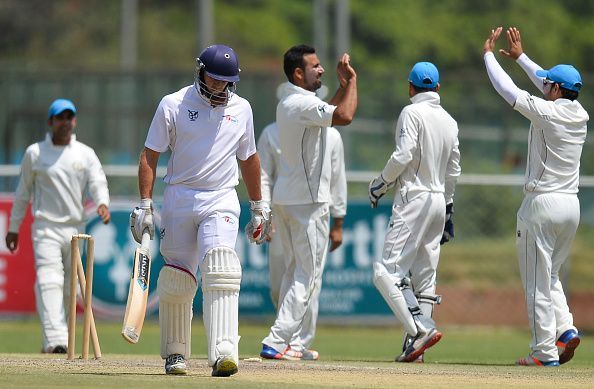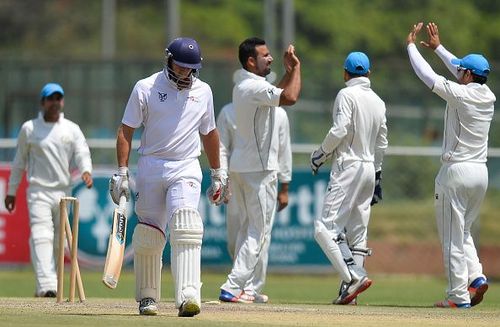
Afghanistan Cricket: The new graduates from the school of hard knocks
Keith Miller, Australia’s flamboyant all-rounder from the 50’s, was once asked if he felt any pressure playing cricket. A Royal Australian Fighter Pilot during World War 2, Miller famously replied saying 'I'll tell you what pressure is. Pressure is a Messerschmitt up your arse. Playing cricket is not'."

The boys from Afghanistan, the latest entrant's to cricket's elite test club, can more than relate to the late Hall-of-Famer’s words. Doused in stories of violence and tragedy, the rise has been incredible, and most heart-warming. Their biggest names have scars that are far more serious than leather ball bruises. The portly, immensely likable Mohammad Shahzad, who idolizes MS Dhoni and insists on being referred to as MS, was born in a Peshawar refugee camp and spent his first eight years enveloped by barbed wire and stern Pakistani guards. Shapoor Zadran, who took Afghanistan over the line for their first ever world cup win, has been attacked by terrorists more than once. Mohammad Nabi’s father has been kidnapped for ransom in the recent past. Their superstar Rashid Khan was playing in the IPL just a few weeks ago when bombs ripped through a local game in his home city of Jalalabad, killing eight and injuring dozens. His teammate Karim Sadiq carried the wounded while Khan appealed for peace and understanding. They have crossed hurdles that most athletes have hardly encountered, and arrived in India wearing smiles that hide more misery than most can handle.
Salim Durrani, India’s yesteryear swashbuckler who flirted with Bollywood and was born in Kabul, was a part of the welcoming committee in Bangalore. It was a nice touch, reminding us of once shared borders, and a common interest in sports, film, music and the arts. If Hollywood was even remotely interested in cricket, this had the potential of a feel-good blockbuster, a tearjerker that goes beyond just being extraordinary in the cricket world, but across all sports.
They deserved a packed stadium, but that seemed wishful thinking on a workday morning in a city filled with people chasing their dreams. A smattering of a few hundred spectators that increased as the day went on and word spread that India's delightful batting line up was on display, cheered generously. The rotund Shahzad was applauded every time he touched the ball, and naughty cheers of 'RCB' rang out when the home team's IPL nemesis Rashid Khan began doing his thing. The Afghan flags in the crowd were hard to miss, waved relentlessly by students like Hazrat Umar Shenwari from Nangarhar, who currently studies business administration in Hyderabad and is a part of a community of 1,000-odd Afghan students there. He proudly wears a ‘Pashteen hat’ right through the day. “This team brings happiness to everyone in Afghanistan” he beamed, as he continued to wave that flag, whether Dhawan swatted a four or Rashid Khan beat the bat.
The fact that they are here in the first place is scarcely believable. They are currently the only cricket playing country in the world where the colonials didn’t influence the game. Ironically, it took two non-cricketing nations for them to gravitate towards cricket. When the cold war superpowers Russia and the US were settling ego scores on Afghani soil, millions spilled into Pakistan with nothing to lose. Many of them returned, sometimes with hopes of building a new life, and infected by cricket. The border was virtually open for decades, with unaccounted thousands crossing over each day to escape a war that they had little to do with. If that wasn’t bad enough, along came the Taliban to rule post-war Afghanistan. Their imposed excesses stretched from forbidding girls from going to school to banning cricket, burying a million dreams and silencing a generation. The US-led invasion followed, driving the Taliban up the hills but also reducing playing fields to rubble. Large parts of the country reeled under relentless bombing, suicide attacks, and senseless violence, and cricket was the last thing on a young kids’ mind until even a few years ago. Yet, here they are today, from not having a national team to playing all three formats, all within the last decade.
Over two days in Bengaluru, they played for the joy of sports, sometimes swinging from the hip like ‘an impetuous child’ as Matthew Hayden said on air. Bred on a fast food cricket diet, they failed to build an innings of substance with the bat, and their spinning stars didn’t prise batsmen out via the hard grind that test cricket demands. They got bowled out twice in two sessions, denying the Chinnaswamy of a potential bumper weekend. They aren’t ready yet by far, and it’s going to be a long, hard road ahead to make a mark in test cricket. But long, hard roads filled with tough battles, scars, losses and heartbreaks have hardly deterred this bunch in the past, have they now?